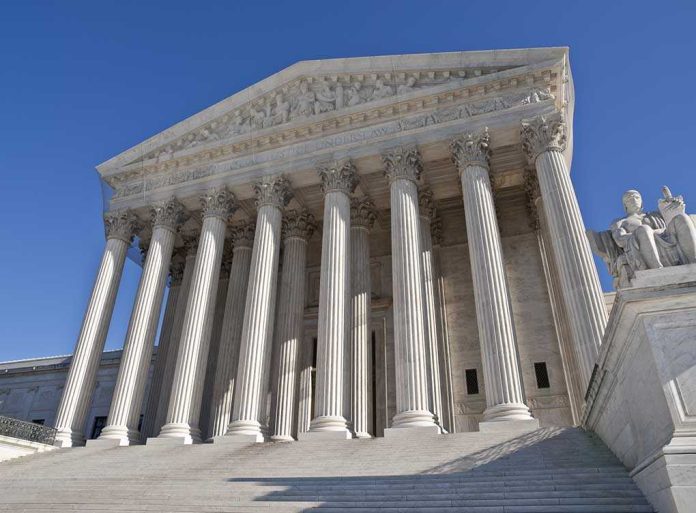
The Supreme Court stands on the brink of potentially dismantling marriage equality as Kim Davis’s petition threatens to overturn the landmark Obergefell v. Hodges decision that legalized same-sex marriage nationwide.
Story Highlights
- Former Kentucky clerk Kim Davis petitions Supreme Court to overturn Obergefell v. Hodges ruling
- Court scheduled to consider Davis’s petition on November 7, 2025, with decision possible by November 10
- Case represents first major post-Dobbs challenge to LGBTQ+ rights precedent
- Religious liberty advocates see opportunity for expanded First Amendment protections
Davis Challenges Marriage Equality Foundation
Kim Davis, the former Rowan County, Kentucky clerk who made national headlines for refusing to issue marriage licenses to same-sex couples, has formally petitioned the Supreme Court to reconsider its 2015 Obergefell v. Hodges decision. Davis argues her First Amendment religious liberty rights were violated when she faced legal liability for refusing to comply with the Court’s marriage equality mandate. Her case directly challenges the constitutional foundation that guaranteed same-sex couples the right to marry under the 14th Amendment’s equal protection and due process clauses.
The petition comes after Davis lost her appeals in lower courts, including a decisive ruling from the 6th Circuit Court of Appeals. That court determined government officials cannot claim First Amendment protections when refusing to perform their official duties, even when those duties conflict with personal religious beliefs. Davis now seeks vindication through the nation’s highest court, asking justices to both absolve her of liability and fundamentally reconsider whether same-sex marriage deserves constitutional protection.
Constitutional Precedent Under Conservative Scrutiny
The Supreme Court’s willingness to revisit established precedent gained unprecedented attention following the 2022 Dobbs decision that overturned Roe v. Wade. Legal scholars note that Obergefell differs from Roe in its grounding on both substantive due process and equal protection principles, potentially making it more resilient to constitutional challenge. However, the Court’s 6-3 conservative majority has demonstrated readiness to reconsider longstanding precedents when presented with compelling legal arguments and appropriate case vehicles.
Justice Samuel Alito’s Dobbs opinion explicitly stated the abortion ruling should not affect other precedents, yet constitutional law experts remain concerned about the security of civil rights decisions based on similar legal reasoning. The Davis petition represents exactly the type of “live dispute” necessary for the Court to revisit Obergefell, creating genuine uncertainty about marriage equality’s future. Religious liberty organizations view this as a crucial opportunity to expand First Amendment protections for faith-based objections to government mandates.
National Implications for Religious Freedom
The case highlights fundamental tensions between religious liberty and civil rights enforcement that have intensified since Obergefell became law. Davis’s supporters argue government officials should not face legal consequences for adhering to sincere religious convictions, particularly when alternative accommodation methods exist. They contend forcing religious believers to violate their conscience in official capacities represents dangerous government overreach that threatens First Amendment foundations cherished by conservatives nationwide.
The Respect for Marriage Act, passed in 2022, provides some federal protection by requiring interstate recognition of same-sex marriages, but it cannot guarantee the constitutional right to marry if Obergefell falls. States would regain authority to define marriage within their borders, potentially creating a complex patchwork of rights and recognition that undermines legal certainty for American families. This prospect particularly concerns defenders of traditional federalism who prefer state-level decision-making over federal judicial mandates.
The Supreme Court’s November 7 consideration of Davis’s petition will determine whether this challenge proceeds to full review, potentially triggering the most significant religious liberty versus civil rights battle since Obergefell itself. Conservative advocates see an opportunity to restore constitutional balance between competing fundamental rights, while opponents warn of devastating consequences for established legal protections. The decision reflects broader questions about judicial precedent, religious accommodation, and the proper scope of constitutional rights that will shape American law for generations.
Sources:
Will the Supreme Court revisit its ruling on same-sex marriage? – SCOTUSblog
United in Love: Understanding Obergefell v. Hodges and Marriage Equality in 2025 – Equality Ohio
Davis v. Ermold Brief in Opposition – Supreme Court of the United States




